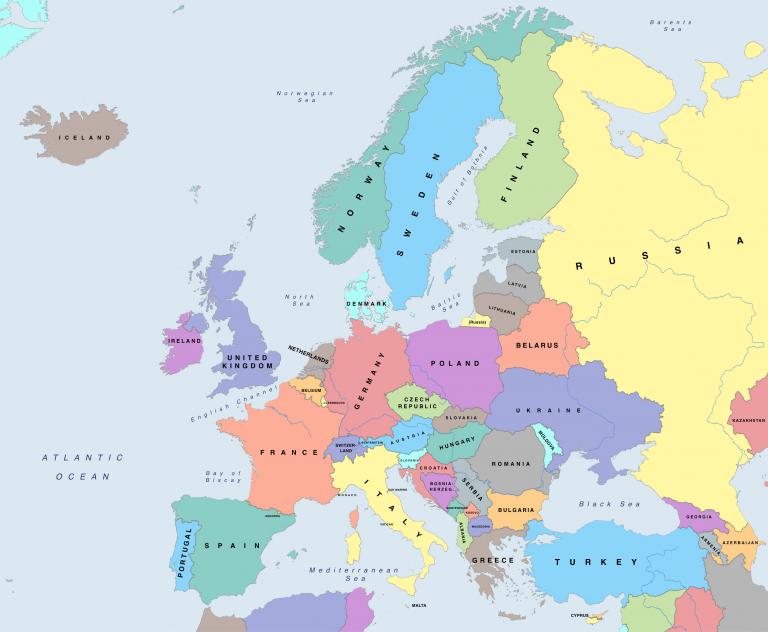Last year a group of European conservative intellectuals (including Roger Scruton) met in Paris in an effort to define European culture and to identify the threats against it. They drew up a document they called The Paris Statement.
Essentially, they said that European culture consists of distinct nations (as opposed to a bureaucratic European Union), which have their cultural foundations in Christianity and in the Classical heritage of Greece and Rome. This “true Europe” is currently being undermined by a “false Europe” based in sexual liberation, progressivism, and multiculturalism.
The document also explores the current problem of extensive immigration into Europe, especially from Islamic countries. This threatens European culture not only because of the upsurge of people who do not share it, but because of the “false European” attitude that European culture should be replaced by multiculturalism and globalism.
Here are some sections from the Paris Statement. Afterwards, I raise two questions that I’d like you to think about and comment upon.
From The Paris Statement:
3. The patrons of the false Europe are bewitched by superstitions of inevitable progress. They believe that History is on their side, and this faith makes them haughty and disdainful, unable to acknowledge the defects in the post-national, post-cultural world they are constructing. Moreover, they are ignorant of the true sources of the humane decencies they themselves hold dear—as do we. They ignore, even repudiate the Christian roots of Europe. At the same time they take great care not to offend Muslims, who they imagine will cheerfully adopt their secular, multicultural outlook. Sunk in prejudice, superstition and ignorance, and blinded by vain, self-congratulating visions of a utopian future, the false Europe reflexively stifles dissent. This is done, of course, in the name of freedom and tolerance. . . .
9. The true Europe has been marked by Christianity. The universal spiritual empire of the Church brought cultural unity to Europe, but did so without political empire. This has allowed for particular civic loyalties to flourish within a shared European culture. The autonomy of what we call civil society became a characteristic feature of European life. Moreover, the Christian Gospel does not deliver a comprehensive divine law, and thus the diversity of the secular laws of the nations may be affirmed and honoured without threat to our European unity. It is no accident that the decline of Christian faith in Europe has been accompanied by renewed efforts to establish political unity—an empire of money and regulations, covered with sentiments of pseudo-religious universalism, that is being constructed by the European Union.10. The true Europe affirms the equal dignity of every individual, regardless of sex, rank or race. This also arises from our Christian roots. Our gentle virtues are of an unmistakably Christian heritage: fairness, compassion, mercy, forgiveness, peace-making, charity. Christianity revolutionized the relationship between men and women, valuing love and mutual fidelity in an unprecedented way. The bond of marriage allows both men and women to flourish in communion. Most of the sacrifices we make are for the sake of our spouses and children. This spirit of self-giving is yet another Christian contribution to the Europe we love.11. The true Europe also draws inspiration from the Classical tradition. We recognize ourselves in the literature of ancient Greece and Rome. As Europeans, we strive for greatness, the crown of the Classical virtues. At times, this has led to violent competition for supremacy. But at its best, an aspiration toward excellence inspires the men and women of Europe to craft musical and artistic works of unsurpassed beauty and to make extraordinary breakthroughs in science and technology. The grave virtues of the self-possessed Romans and the pride in civic participation and spirit of philosophical inquiry of the Greeks have never been forgotten in the real Europe. These inheritances, too, are ours. . . .13. The true Europe is in jeopardy. The achievements of popular sovereignty, resistance to empire, cosmopolitanism capable of civic love, the Christian legacy of humane and dignified life, a living engagement with our Classical inheritance—all this is slipping away. As the patrons of the false Europe construct their faux Christendom of universal human rights, we are losing our home.14. The false Europe boasts of an unprecedented commitment to human liberty. This liberty, however, is very one-sided. It sells itself as liberation from all restraints: sexual freedom, freedom of self-expression, freedom to “be oneself.” The Generation of ’68 regards these freedoms as precious victories over a once almighty and oppressive cultural regime. They see themselves as great liberators, and their transgressions are acclaimed as noble moral achievements, for which the whole world should be grateful. . . .16. At the same time that we hear boasts of unprecedented liberty, European life is more and more comprehensively regulated. Rules—often confected by faceless technocrats in league with powerful interests—govern our work relationships, our business decisions, our educational qualifications, our news and entertainment media. And Europe now seeks to tighten existing regulations on freedom of speech, an aboriginal European freedom—freedom of conscience made manifest. The targets of these restrictions are not obscenity or other assaults on decency in public life. Instead, Europe’s governing classes wish to restrict manifestly political speech. Political leaders who give voice to inconvenient truths about Islam and immigration are hauled before judges. Political correctness enforces strong taboos that deem challenges to the status quo beyond the pale. The false Europe does not really encourage a culture of freedom. It promotes a culture of market-driven homogeneity and politically enforced conformity.17. The false Europe also boasts of an unprecedented commitment to equality. It claims to promote non-discrimination and the inclusion of all races, religions and identities. Here, genuine progress has been made, but a utopian detachment from reality has taken hold. Over the past generation, Europe has pursued a grand project of multiculturalism. To demand or even promote the assimilation of Muslim newcomers to our manners and mores, much less to our religion, has been thought a gross injustice. A commitment to equality, we have been told, demands that we abjure any hint that we believe our culture superior. Paradoxically, Europe’s multicultural enterprise, which denies the Christian roots of Europe, trades on the Christian ideal of universal charity in an exaggerated and unsustainable form. It requires from the European peoples a saintly degree of self-abnegation. We are to affirm the very colonization of our homelands and the demise of our culture as Europe’s great twenty-first century glory—a collective act of self-sacrifice for the sake of some new global community of peace and prosperity that is being born.Multiculturalism is unworkable.18. There is a great deal of bad faith in this thinking. Most in our governing classes doubtless presume the superiority of European culture—which must not be affirmed in public in ways that might offend immigrants. Given that superiority, they think that assimilation will happen naturally, and quickly. In an ironic echo of the imperialist thinking of old, Europe’s governing classes presume that, somehow, by the laws of nature or of history, ‘they’ will necessarily become like ‘us’—and it is inconceivable that the reverse might be true. In the meantime, official multiculturalism has been deployed as a therapeutic tool for managing the unfortunate but ‘temporary’ cultural tensions.
By the standards of the Paris Statement, “False Europe” is more of a threat to “True Europe” than the immigrants are. Might the social conservatism of the immigrants bring about the end of “False Europe,” especially if the Islamic immigrants convert not to progressivism but to Christianity, as has started to happen?












